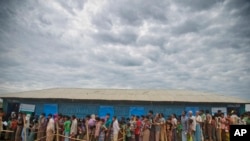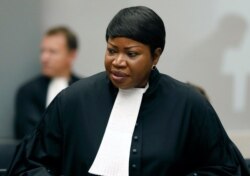The International Criminal Court prosecutor on Thursday filed a request with judges to open a formal investigation of crimes against humanity allegedly committed against Rohingya Muslims from Myanmar.
Prosecutor Fatou Bensouda said she wants to investigate crimes of deportation, inhumane acts and persecution allegedly committed as Rohingya were driven from Myanmar, which is not a member of the global court, into Bangladesh, an ICC member.
The announcement marked a significant step in efforts to deliver justice to victims of one of the world’s worst humanitarian crises of recent years. ICC judges will carefully study the 146-page written request before deciding whether to authorize an investigation.
Bensouda said that a preliminary probe established “a reasonable basis to believe that at least 700,000 Rohingya people were deported from Myanmar to Bangladesh through a range of coercive acts, and that great suffering or serious injury has been inflicted on the Rohingya through violating their right to return to their state of origin.”
Her written request said that the coercive acts allegedly committed by Myanmar’s armed forces, border guards and police included “killings; rapes and other forms of sexual violence; acts of physical and psychological violence intentionally causing great suffering, or serious injury to body or to mental or physical health; and the destruction of property including homes, livestock and entire villages.”
Last year, the court ruled that it has jurisdiction over alleged deportation of Rohingya to Bangladesh because part of the crimes allegedly happened in Bangladesh.
Myanmar’s military has been accused of widespread rights violations leading about 700,000 Rohingya to flee the country since August 2017. Bensouda said she wants her investigation to date back to October 2016.
Bensouda said her investigation is limited by the fact that Myanmar is not a member of the court, meaning her investigation “would not extend to all crimes potentially committed in Myanmar, but will focus on crimes allegedly committed in part on the territory of Bangladesh.”
But she added that investigating deportations also will mean “taking a close look at the alleged violence that left the Rohingya no genuine choice but to flee Myanmar.”
Buddhist-majority Myanmar has long considered the Rohingya to be “Bengalis” from Bangladesh even though their families have lived in the country for generations. Nearly all have been denied citizenship since 1982, effectively rendering them stateless.
The long-simmering Rohingya crisis exploded in August 2017 when Myanmar’s military launched what it called a clearance campaign in Rakhine in response to an attack by a Rohingya insurgent group. The campaign led to the mass Rohingya exodus to Bangladesh and to accusations that security forces committed mass rapes and killings and burned thousands of homes.
The International Criminal Court is a court of last resort that takes on cases when national authorities are unable or unwilling to prosecute alleged atrocities.
Bensouda said that potential cases arising from her investigation should be admissible under ICC rules due to “the gravity of the acts committed ... and the absence of relevant national investigations or prosecutions in Myanmar” or other countries.








